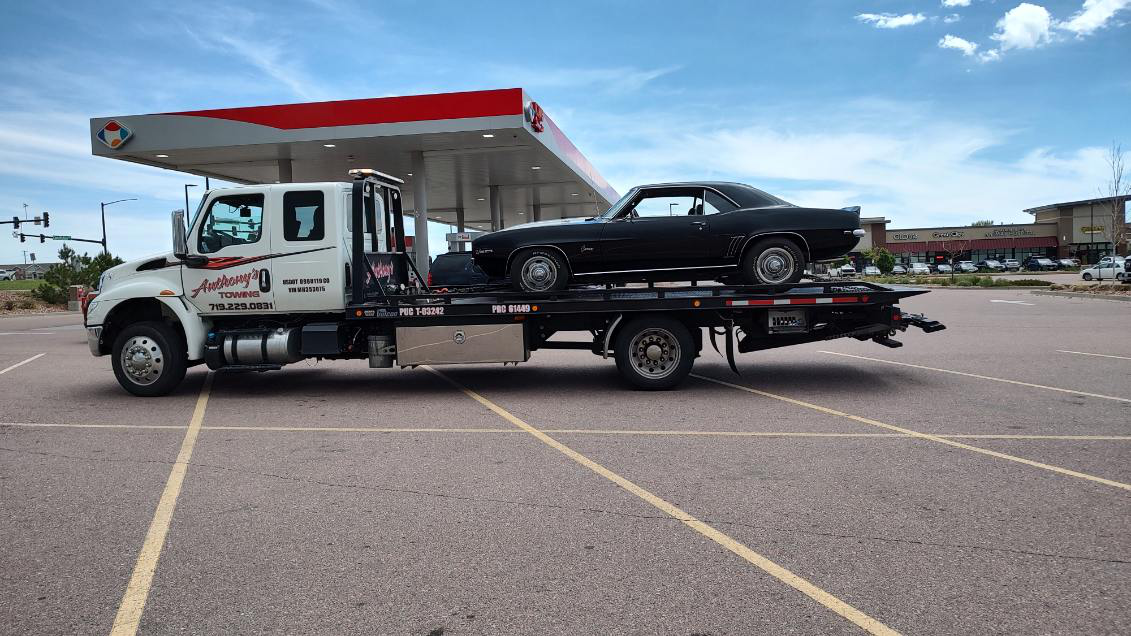
Towing services are an essential support system for vehicle owners in Chicago, IL. Whether it’s a breakdown on the highway or a fender bender in the city, having access to reliable towing assistance can make all the difference in getting back on track quickly and safely. One common issue that many drivers face is running out of fuel while towing their vehicles. This article will explore the importance of fuel delivery services specifically tailored for towing situations, highlighting the 24/7 availability and efficient response times offered by reputable tow truck companies.
Consider this hypothetical scenario: A driver embarks on a long-distance journey from Chicago to another state with their beloved vintage car hitched onto a trailer behind them. As they traverse through unfamiliar territories, engrossed in enjoying the scenic beauty around them, they unintentionally overlook refueling their own tank. Suddenly, anxiety sets in as their engine sputters and eventually grinds to a halt amidst nowhere but miles away from any gas station. This harrowing situation emphasizes the significance of having dedicated fuel delivery services readily accessible for towing instances.
In order to meet the unique needs of stranded motorists who find themselves low on fuel while towing, established tow truck businesses across Chicago have stepped up to provide specialized solutions. These service providers understand the importance of having a reliable fuel delivery service that caters specifically to towing situations. They recognize that running out of fuel while towing can be a frustrating and potentially dangerous experience, which is why they offer 24/7 availability and efficient response times.
When a driver finds themselves in the unfortunate situation of running out of fuel while towing their vehicle, all they need to do is contact a reputable tow truck company that offers fuel delivery services. These companies have dedicated vehicles equipped with extra fuel tanks and pumps, allowing them to quickly deliver the necessary fuel directly to the stranded vehicle.
The 24/7 availability ensures that assistance is just a phone call away at any time of the day or night. This is particularly important for those who may find themselves in remote areas or during non-business hours when gas stations may be closed. With a dedicated fuel delivery service for towing situations, drivers can have peace of mind knowing that help will always be available when they need it most.
Efficient response times are another crucial aspect of these specialized fuel delivery services. Recognizing the urgency of the situation, tow truck companies prioritize quick responses to ensure minimal disruption to the driver’s journey. The goal is to get the stranded vehicle back on the road as soon as possible so that the driver can resume their trip without any further delays or complications.
In conclusion, having access to dedicated fuel delivery services tailored for towing situations is essential for vehicle owners in Chicago. Whether it’s a long-distance journey or a local trip within the city, drivers can rely on reputable tow truck companies to provide prompt assistance whenever they run out of fuel while towing. The 24/7 availability and efficient response times offered by these service providers ensure that drivers can get back on track quickly and safely, minimizing any inconvenience or potential hazards along the way.
The importance of fuel delivery for towing services
Picture this scenario: it’s a busy afternoon in downtown Chicago, and your towing business receives an urgent call for assistance. A stranded vehicle is blocking traffic on a major road, causing frustration among drivers and potential safety hazards. As the owner of a reliable towing service in Chicago, you understand that quick response times are crucial to maintaining customer satisfaction and ensuring public safety.
One common challenge faced by towing services is running out of fuel during an operation. Whether it’s due to unforeseen circumstances or poor planning, this situation can significantly delay the completion of a tow job. For instance, imagine having to leave a stranded motorist alone at night because your tow truck ran out of fuel midway through the operation. Such incidents not only tarnish your reputation but also create unnecessary stress for both you and the affected individuals.
To illustrate further, consider these four key reasons why fuel delivery plays an integral role in towing operations:
- Minimizing downtime: Running out of fuel can lead to extended periods of waiting time while arranging for additional resources or refueling the tow truck.
- Ensuring timely assistance: Swift arrival at the scene ensures prompt resolution of emergencies and helps ease congested traffic situations.
- Maintaining professionalism: Consistently meeting customers’ expectations demonstrates reliability, fostering positive relationships with clients who may require future assistance.
- Enhancing operational efficiency: Adequate fuel reserves allow for smooth execution of multiple jobs without interruptions or delays.
By keeping these factors in mind, you can ensure that your towing service remains well-prepared for any situation that arises. To reinforce its significance even further, let us examine how different aspects contribute to successful fuel delivery management using the following table:
| Aspect | Importance | Benefit |
|---|---|---|
| Timely response | Ensures efficient resolution | Minimize inconvenience caused by stalled vehicles |
| Adequate fuel reserves | Prevents unnecessary delays | Enhance overall operational efficiency |
| Reliable refueling system | Enables seamless operations | Maintain professionalism and customer satisfaction |
| Effective communication | Facilitates coordination among team members | Promptly address any unforeseen challenges |
As a towing business owner in Chicago, it is crucial to prioritize the implementation of effective fuel delivery practices. By doing so, you not only guarantee timely assistance but also reinforce your commitment to maintaining high standards within the industry.
Moving forward, let us explore some common reasons why vehicles may run out of fuel while being towed, shedding light on potential areas where proactive measures can be taken for prevention.
Common reasons for running out of fuel while towing
The Importance of Fuel Delivery for Towing Services
Running out of fuel while towing can be a frustrating and potentially dangerous situation. To illustrate the significance of timely fuel delivery, let’s consider an example: Imagine a tow truck driver in Chicago who is transporting a heavy vehicle to a repair shop during rush hour. Suddenly, the tow truck runs out of fuel on a busy highway, causing traffic congestion and posing safety risks for both the stranded driver and other commuters.
When it comes to running out of fuel while towing, there are several common reasons that drivers may encounter:
- Unforeseen Delays: Unexpected traffic jams or detours can significantly extend travel time, leading to increased fuel consumption.
- Inaccurate Fuel Gauge Readings: Faulty gauges or incorrect readings can mislead drivers into believing they have more fuel than they actually do.
- Overestimating Fuel Capacity: When towing larger vehicles or carrying heavier loads, fuel consumption rates tend to increase due to added weight and resistance.
- Neglecting Maintenance Checks: Failing to regularly inspect and maintain the tow truck’s engine, including its fuel system components, increases the risk of unexpected breakdowns.
- Stranded customers experience inconvenience and potential delays in reaching their destinations.
- Tow truck operators face reputational damage as their reliability and professionalism come into question.
- Traffic disruptions caused by stalled tow trucks can lead to additional expenses such as fines or penalties.
- Increased stress levels among all parties involved due to unforeseen circumstances.
As depicted in this three-column table showcasing different perspectives associated with running out of fuel during towing operations:
| Customer Perspective | Business Owner Perspective | General Public Perspective |
|---|---|---|
| Delayed schedule | Damaged reputation | Increased commute times |
| Inconvenience | Loss of potential customers | Traffic congestion |
| Increased costs | Negative reviews | Safety hazards |
| Stressful experience | Legal liabilities | Environmental impact |
As a towing business owner in Chicago, it is vital to prioritize fuel delivery services for both the safety and satisfaction of your clients. By ensuring prompt refueling when needed, you can mitigate the risks associated with running out of fuel while towing.
Transitioning into the subsequent section about “The benefits of using a professional fuel delivery service,” it becomes evident that relying on a reliable provider not only prevents these issues but also offers additional advantages.
The benefits of using a professional fuel delivery service
Running out of fuel while towing can be a frustrating and inconvenient experience. To illustrate the common scenarios faced by our customers, let’s consider a hypothetical situation where an individual is towing their vehicle from one location to another in Chicago, IL. Suddenly, they realize that they have run out of fuel, leaving them stranded on the side of the road.
There are several reasons why running out of fuel while towing can occur. These include:
- miscalculating the amount of fuel required for the journey
- encountering unexpected delays or traffic congestion, leading to increased fuel consumption
- relying solely on visual estimations rather than using accurate measurement tools
- neglecting regular maintenance checks on the towed vehicle’s fuel gauge
- Avoid unnecessary stress and frustration.
- Minimize downtime and get back on track quickly.
- Ensure safety for yourself and other motorists.
- Receive expert guidance from trained professionals.
Additionally, let us provide you with a 3-column table showcasing how utilizing a professional fuel delivery service for towing can benefit you:
| Benefits | Explanation |
|---|---|
| Prompt Assistance | Quick response time ensures minimal wait period. |
| Reliable Service | Trained technicians handle your needs efficiently. |
| Peace of Mind | Professionalism guarantees quality and safety. |
As a local towing business owner serving Chicago, IL, we understand that finding oneself stranded without fuel during a tow is far from ideal. That is why we strive to offer reliable and efficient solutions to ensure that our customers’ journeys are as smooth as possible.
In preparation for future sections about choosing the right fuel delivery service for your towing needs, it is crucial to assess various factors such as cost-effectiveness, availability around-the-clock, positive customer reviews, and flexibility in accommodating different types of vehicles. By considering these aspects, you can make an informed decision that suits your specific requirements and ensures a hassle-free towing experience.
How to choose the right fuel delivery service for towing
Fuel delivery services are crucial for towing companies in Chicago, IL, as they provide a convenient and efficient solution when vehicles run out of fuel on the road. For instance, imagine a scenario where a towing company receives a distress call from a stranded motorist who has run out of gas on a busy highway during rush hour. In this situation, having access to a reliable and professional fuel delivery service can be invaluable.
There are several key factors to consider when choosing the right fuel delivery service for towing needs:
-
Prompt response time: A dependable fuel delivery service should prioritize quick response times to ensure that stranded motorists receive assistance promptly. This is particularly important in emergency situations where individuals may be stuck in dangerous or vulnerable locations.
-
Availability 24/7: Towing emergencies can happen at any time, day or night. Therefore, it is essential to select a fuel delivery service that operates round the clock. This ensures that help is readily available whenever needed, providing peace of mind for both the towing company and their clients.
-
Proper licensing and certifications: To guarantee professionalism and adherence to industry standards, it is vital to choose a fuel delivery service with proper licensing and certifications. These credentials indicate that the service provider meets all necessary legal requirements and follows best practices in their operations.
-
Competitive pricing: As business owners ourselves, we understand the importance of cost-effectiveness while maintaining high-quality services. When selecting a fuel delivery service for towing purposes, it is wise to compare prices among different providers to ensure competitive rates without compromising on reliability.
By considering these factors when selecting a fuel delivery service for your towing business in Chicago, IL., you can enhance your ability to offer comprehensive roadside assistance solutions that meet customers’ needs efficiently.
Understanding the process of fuel delivery for towing will further equip us with valuable knowledge about how this critical aspect of our business works seamlessly within our operations.
Understanding the process of fuel delivery for towing
Fuel delivery for towing is an essential service that ensures a smooth and efficient operation, especially in emergency situations. To understand the process better, let’s take a look at a hypothetical case study.
Imagine a scenario where a towing company receives a call from a stranded vehicle on the outskirts of Chicago. The driver ran out of fuel while transporting heavy machinery to another location. In such cases, having access to reliable fuel delivery services becomes crucial.
When it comes to choosing the right fuel delivery service for towing, there are several factors to consider:
- Availability: Round-the-clock availability is vital as emergencies can happen at any time.
- Response Time: Timely response is crucial to minimize downtime and avoid potential hazards.
- Fuel Type: Ensure that the fuel delivery service provides the specific type of fuel required for your vehicles or equipment.
- Safety Measures: Look for providers who prioritize safety protocols during fuel transportation and dispensing.
Now let’s delve into understanding the process of fuel delivery for towing through this three-column table showcasing key steps involved:
| Step | Description | Importance |
|---|---|---|
| Step 1 | Receiving distress call and obtaining necessary information | Ensures effective response |
| Step 2 | Dispatching tow truck with designated quantity and type of fuel | Minimizes delay |
| Step 3 | Transporting fuel safely to the stranded vehicle | Prevents accidents |
| Step 4 | Refueling the vehicle or equipment efficiently | Resumes normal operations |
As a towing business owner in Chicago IL, providing reliable and prompt fuel delivery services is our priority. We understand how crucial it is to have trustworthy assistance when faced with unexpected circumstances like running out of fuel during towing operations.
In conclusion, ensuring you choose the right fuel delivery service for towing can make all the difference in minimizing downtime and avoiding unnecessary complications during emergencies. Now let’s explore some important tips for preventing fuel emergencies during towing, which will further enhance the efficiency and safety of your operations.
Tips for preventing fuel emergencies during towing
Understanding the Process of Fuel Delivery for Towing
In a bustling city like Chicago, IL, fuel emergencies during towing can occur unexpectedly. Imagine this scenario: A tow truck is dispatched to assist a stranded vehicle on the highway. The driver arrives at the scene only to discover that the stranded vehicle has run out of fuel. In such situations, fuel delivery becomes crucial in order to resume towing operations efficiently.
To ensure a seamless process of fuel delivery for towing, there are several key steps that need to be followed:
- Assessing the situation: Before initiating any action, it is important to assess the overall condition of both vehicles involved in the towing operation and verify if fuel delivery is indeed required.
- Determining the appropriate amount of fuel needed: Understanding the capacity and requirements of each vehicle will help determine how much fuel needs to be delivered. This step ensures that enough fuel is provided without causing any overflow or wastage.
- Sourcing high-quality fuel promptly: To minimize delays and inconvenience caused by running out of gas during towing, reliable sources for high-quality fuel should be established beforehand. This enables quick access to sufficient quantities when needed.
- Implementing safety measures: Safety precautions must always be taken into consideration throughout the entire process of fuel delivery for towing. Ensuring proper ventilation and avoiding open flames are just two examples among various safety practices that must be adhered to.
- Peace of mind knowing assistance is available 24/7
- Prompt response time from experienced professionals
- Eliminates additional stress during an already challenging situation
- Reliable service tailored specifically for towing needs
Table showcasing different types of fuels used in emergency situations:
| Type | Advantages | Disadvantages |
|---|---|---|
| Gasoline | Widely available | Potential flammability risks |
| Diesel | Higher energy content | Limited availability in some areas |
| Propane | Can be stored for long-term emergencies | Limited refilling options |
| Ethanol-blend | Environmentally friendly | Lower energy content |
As a towing business owner in Chicago, IL, it is essential to understand the process of fuel delivery during towing operations. By following these steps and ensuring access to reliable sources of high-quality fuel, you can provide efficient and professional services that prioritize safety and customer satisfaction.
In summary, effective fuel delivery for towing involves assessing the situation, determining the appropriate amount of fuel needed, sourcing reliable sources promptly, and implementing necessary safety measures. By prioritizing these aspects within your towing operation, you can guarantee a smooth and hassle-free experience for both drivers stranded on the road and your own team.



